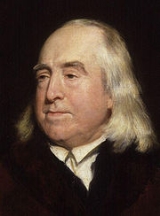
. He is best known for his advocacy of utilitarianism
and animal rights
, and the idea of the panopticon
.
His position included arguments in favour of individual and economic freedom
, usury
, the separation of church and state
, freedom of expression, equal rights for women, the right to divorce, and the decriminalising of homosexual acts.
Prose is when all the lines except the last go on to the end. Poetry is when some of them fall short of it.![]()
To what shall the character of utility be ascribed, if not to that which is a source of pleasure?![]()
Submit not to any decree or other act of power, of the justice of which you are not yourself perfectly convinced. If a constable call upon you to serve in the militia, shoot the constable and not the enemy; — if the commander of a press-gang trouble you, push him into the sea — if a bailiff, throw him out of the window. If a judge sentences you to be imprisoned or put to death, have a dagger ready, and take a stroke first at the judge.![]()
I. Nature has placed mankind under the governance of two sovereign masters, pain and pleasure. It is for them alone to point out what we ought to do, as well as to determine what we shall do.
![]()

